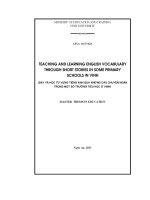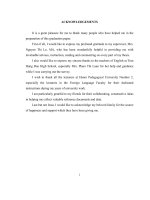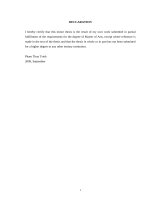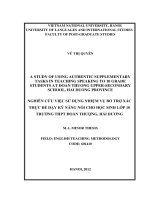Some methods of teaching and learning english vocabulary for 6th grade students at tran mai ninh secondary school
Bạn đang xem bản rút gọn của tài liệu. Xem và tải ngay bản đầy đủ của tài liệu tại đây (196.95 KB, 20 trang )
THANH HOA CITY
THANH HOA DEPARTMENT OF EDUCATION AND
TRAINING
INITIATIVE
SOME METHODS OF TEACHING AND LEARNING
ENGLISH VOCABULARY FOR 6th GRADE STUDENTS AT
TRAN MAI NINH SECONDARY SCHOOL
Writer: Nguyen Thi Thuy Hang
Position: Teacher
School: Tran Mai Ninh Secondary School
Subject: English
THANH HOA - 2020
0
TABLE OF CONTENT
CHAPTER 1: INTRODUCTION
1.1. Rationale
page 2
1.2. Objectives of the study
page 3
1.3. Sample of the study
page 3
1.4. Scope of the study
page 3
1.5. Research methodology
page 3
CHAPTER 2: PROBLEM SOLVING
2.1. Some topics of vocabulary in English
page 4
2.2. Some techniques to learn vocabulary in English
page 4
2.3. Drills for practice
page 7
CHAPTER 3: CONCLUSION AND RECOMMENDATION
3.1. Findings
page 12
3.2. Recommendations
page 12
REFERENCES
page 19
CHAPTER 1: INTRODUCTION
1
1.1. RATIONALE
1.1.1. Theoretical basis
Integrating with the trend of social development in particular and the
world in general, English subject has an important role to play in the
comprehensive development of each student. With the aim at enabling them to
integrate with international and regional communities, access various
information about science and technology as well as apply the acquired
knowledge at school effectively, educational management levels have
continually opened different themes, seminars and model lessons... on issues
about innovating the teaching and learning methods of foreign language.
Currently, in the process of innovating teaching approach, the ultimate
aim is to form and develop students the basic knowledge, skills in English and
intellectual qualities necessary to continue studying or working.
Along with the skills of listening, speaking, reading and writing, learning
vocabulary is essential. Vocabulary works as an important basis for them to
complete their skills in learning any foreign languages. However, in fact
learning a foreign language is not easy, so students often get bored because of
numerous challenges in foreign language learning. One of their difficulties is to
perceive and memorize words they have learned or read before. Therefore, it is
pivotal for teachers should show their students effective techniques to study and
remember words so that vocabulary is not the serious burden to them.
1.1.2. Practical basis
Teaching and learning foreign language is different from other school
subjects as it is about an exotic language. As a result, students are faced with
numerous challenges, especially in Vietnam where English is taught as one of
many foreign languages and students do not have many opportunities to use
English outside classrooms and Tran Mai Ninh Secondary School in Thanh Hoa
city is not an exception. Therefore, the teacher should find out and provide them
with techniques to learn vocabulary effectively while creating favorable learning
conditions which are conducive to students’ willingness to learn vocabulary as
well as English. Accordingly, they are more interested in English, which make
the learning process become more comfortable.
After conducting mini tests to the students of 3 classes 6C, 6F, 6H at Tran
Mai Ninh Secondary School with the same content, the results are as follows:
Classes
6C
6F
6H
Number of students
18/ 37
22/ 46
23/ 45
with pass mark (50%)
The table above shows that the number of students scored the pass mark is
on about the average (the number of students scoring the average mark is around
50% in all 3 classes). It is evident that the students' lexical resource is relatively
limited compared with the knowledge of the vocabulary they have been
provided from the secondary level.
2
On the basis of theory and reality as well as my teaching experience, I
finally select the teaching initiative named "Some methods of teaching and
learning English vocabulary for 6th grade students at Tran Mai Ninh secondary
school".
1.2. Objectives of the study:
- Work out the methods of teaching and learning vocabulary suitable for
high school students
- Consolidate the lexical resource for students by developing exercises
for them to practice.
1.3. Subject of the study
6th grade students at Tran Mai Ninh secondary school have learned 10year English pilot program published by the Ministry of Education and Training.
1.4. Scope of the study
Lexical resource is taken from English course book for 6 th grade students
in 1st semesters.
1.5. Research methodology:
1) Quantitative method: The author systematizes the number of vocabulary that
students have learned
2) Observation: The author has experienced teaching in many classes and
compared different classes. The evidence is shown through results of tests that
the author marked.
3) Interview: The author interviews students about the learning method of
vocabulary. In the position of group leader of English teachers, the author has
chance to interview other colleagues, parents and students.
4) Experimental method: Students in two experimental classes were asked to do
two similar tests before and during the study (after the application of the
techniques to learn vocabulary), then the author compares and draws the final
conclusion about the practicality of appropriate methods of learning vocabulary.
3
CHAPTER 2: PROBLEM SOLVING
Like the Vietnamese vocabulary, English vocabulary is divided into
diverse types and different topics. Therefore, in order to remember groups of
vocabulary we need to have these suitable methods and techniques to memorize
each type of word.
2.1. Some topics of vocabulary in English:
a / Direction: Behind, in front of, to the left of, to the right of, opposite, near,
next to, the between ...
b/ School: School, grade, classroom, English, literature, history, geography,
math, Timetable ...
c/ Occupation: Student, teacher, nurse, doctor, engineer, worker, driver, farmer,
business, policeman ...
d/ Family: Family, sister, brother, father, mother, children, classmate ...
e/ Sports: Sport, soccer, football, volleyball ...
f/ Transportation: Bus, plane, bike, car, motorbike, truck, road sign, accident,
traffic light, intersection ...
g/ Quality: Big, small, noisy, quiet, beautiful, tall, late, old, high, difficult,
dangerous ...
h / Things: Desk, door, window, board, clock, waste basket, schoolbag, pencil,
pen, ruler, eraser, bookshelf, stereo, lamp, couch, armchair, table, chair, stool,
television, telephone, bench, letter, photo, flower, tree ...
k/ Action: Come in, sit down, stand up, close, open, get up, get dressed, brush
one's teeth, wash one's face, have breakfast, go to school / bed, so one's
homework, take a shower, play games / soccer, read, have jobs, spell, walk, turn,
...
l/ Places: House, living room, class, school, floor, classroom, city, town, street,
country, farm, rice paddy, paddy fields, river, hotel, village, store, temple,
restaurant, bank, hospital, factory, museum, stadium, drugstore, toy store, movie
theater, zoo, police station, bakery, well, garden, mountain, clinic, post office,
shop, supermarket, market, sea, food stall, canteen ...
2.2. Some techniques to learn vocabulary in English:
When you encounter a new English word, it is necessary to remember it
immediately and find tips to memorize it. It is a mistake if you forget the word
because when you happen to see it latter, you but cannot remember it or know it
by face without memorizing its meaning. Above are some tips to remember
words faster and for a long time.
2.2.1. Learning vocabulary by grouping them in relevant topic, part of
speech or the extent of use (Using Network)
When learning new words, you should find out whether there exists any
relationship between the words you have already known and new words. Below
4
are effective ways to learn and remember new words. There are some
relationships between words in English as follows:
Example 1:
Mother
Father
FAMILY
Sister
Brother
Children
Friends
Example 2:
Bus
Motorbike
Bike
Accident
Train
ROAD / STREET
Truck
Traffic light
Car
Sign
Intersection
2.2.2. Learning new words through words with similar meaning or
synonyms
Although many adjectives are not synonymous, their meanings are
related to each other because they refer to the qualities of an object, event, or
phenomenon.
The recording and learning words with similar meaning also prove its
effectiveness and these new words will gradually be added to the list during the
learning process.
For example, when talking about the temperature, we have a series of
adjectives demonstrating from low to high temperatures.
5
2.2.3. Learning vocabulary by comparing with opposites/ antonyms
This relationship has a strong impact to the memorization of vocabulary.
For example, when you are asked for a word related to the word 'hot', you will
reply the 'cold', rather than words like 'desert', 'sun', 'weather'.
Consequently, you'll find out that noting and learning words with opposite
meaning are very effective. For example:
cheap
wide
deep
honest
rich
attack
expensive narrow shallow dishonest
poor
defend
2.2.4. Learning vocabulary by combining words
There are words which are often combined together into a phrase such as
'perform a task', 'make a suggestion', or 'do one's homework', etc. You should
also learn how to memorize new words in this way because this technique is
practical and you can understand how to use and incorporate words
systematically.
The words will be recorded in the form of mind map and recall visual
diagram as follows:
Spend
Make
Waste
MONEY
Earn
Invest
2.2.5. Learning words through separation and combination techniques
Example 1: The word “Brusque” (adj) means being rude, impolite
This is a very difficult word to remember and rarely found in English
materials. Let’s see the separation technique to make the memorization at ease.
Brusque can be separated from the BRUS - QUE
6
Then, Brus is transformed into BRUSH and QUE is changed into
QUEEN.
As you can see, words like BRUSH (pen) and QUEEN (Queen) are
simple words to those who have learned English.
Now, the word BRUSQUE originally means "grumpy and rude", you
associate it to BRUSH and QUEEN. Let’s imagine, in the kingdom of the
brush, there is a queen reigning and she is a very rude and gruff person.
The BRUSH QUEEN is very BRUSQUE
Example 2: AUGUR (v): predict
Let’s think AUGUST
Imagine: A magician can AUGUR (predict) what may happen in AUGUST.
A shaman can AUGUR everything that happens in AUGUST.
Example 3: BERATE (v) strict punish
Let’s think BE- A-RAT (a mouse)
Imagine: A naughty boy is punished by a fairy. She BERATE (punishes) him by
MAKING HIM BE A RAT (turning him into a mouse).
2.2.6. Learning vocabulary through association technique
It means that you learn words through associating words with other familiar
words.
For example: Stable (a) = firm and unchanged
The word “stable” is similar in spelling with the word “table”. Your association
is because the table has 4 legs so it is very stable.
2.3. Drills for practice
In order to support students to learn vocabulary effectively, the teacher
should introduce the topic in advance to students. This way can help them focus
on thinking.
2.3.1. Jumbled words
Things
seetor
= stereo
seerra
= eraser
chenb
= bench
notelephe
= telephone
dobar
= board
chocu
= couch
koccl
= clock
paml
= lamps
7
Subjects
lengshi
= English
turelitera
tham
= math
rosyht
biemlatel
= timetable
gygrapheo
= literature
= = history
= geography
This is a type of exercise in which words are jumbled in a disorderly
way and students are asked to find correct words. The exercise helps students
develop the ability to guess words quickly and accurately, as well as generate
excitement for them when revising vocabulary.
2.3.2. Word folks
This type of exercise provides students with a root word/ phrase and they
will have to find words or phrases which can be matched with the original
phrase suitably.
For example:
2.3.3. Word square
This exercise requires students to know words as well as find related
words quickly with suggestion or without suggestion. Before finding the
vocabulary students are provided with topics so students could anticipate the
words related to a given topic and then start to find words given in boxes with
different letters.
For example:
8
Topic: Places/ Means of transport
Answer
V
M
J
C
P
O
O
L
A
pool, car, temple
T
E
O
M
L
L
X
P
O
well, garden, bus
O
P
G
U
A
I
A
H
O
train, zoo
Y
W
A
E
N
R
N
N
Z
N
E
R
R
T
T
K
I
E
I
L
D
M
K
A
A
E
C
A
L
E
K
N
A
B
I
T
R
N
N
C
A
R
U
L
N
T
E
M
P
L
E
S
Q
E
A
T
C
Q
W
X
N
N
Z
I
G
H
T
E
Y
B
E
H
I
A
K
N
M
S
B
E
J
near, next
opposite
R
F
R
R
N
L
D
O
N
T
X
F
A
P
L
E
F
T
T
K
P
U
V
T
H
O
O
E
T
W
E
N
B
E
apartment
park, vegetable, market,
mountain, plane
Answer
E
Q
O
bank
right, behind, front,
left, between
2.3.3. Crossword Puzzles:
Crossword puzzles require students’ ability to remember the words
because in order to do this exercise, students must deal with crossword puzzles
with clues given. After understanding the clues to infer, students have to find the
exact word to match the crossword. Normally, this exercise requires students to
find the key word which is the first presumed vertical column.
Another difficulty for students is that there is no common topic for
crossword so students can hardly judge the key word in vertical column if they
cannot solve quizzes in horizontal cells. Because of the difficulty and precision
of vocabulary, students need to have relatively abundant lexical resource.
9
Therefore, this exercise will help students with the ability to think quickly and
become more responsive to the vocabulary. Besides, students can memorize
words much better after completing the crossword.
For example:
1. A natural cavity below the earth surface or in the mountain.
2. Light of the sun.
3. A large natural stream of water.
4. A short journey usually for pleasure.
5. A temple or sacred tower in Asian countries.
6. The science that studies the surface of the earth and its associated physical,
biological, economic, political features.
7. A hill of impressive height
Key
S
P
A
U
G
C
A
V
E
S
H
I
N
E
R
I
V
E
R
E
X
C
U
R
S
I
O
N
O
D
A
E
U
O
N
G
T
R
A
A
I
P
N
N
G
M O
2.3.5. Network
Students will be given a hint and they need to list words related to the
teacher’s suggestion (as much as possible).
In a network exercise, students should remember words in themes, read
and write them on their own without any hint. This exercise will help students
10
systematize words in accordance with themes, remember how to read and write
the exact words.
For example:
Classical
music
Rock ‘n’
Roll
Jazz
Types of
Music
Pop music
Folk music
11
CHAPTER 3: CONCLUSION AND RECOMMENDATION
3.1. Findings
Based on the experience of teaching and experimental students’ results in
vocabulary exercises in 3 classes 6C, 6F, 6H at Tran Mai Ninh secondary school,
the results of effectiveness after applying the techniques to learn English
vocabulary can be seen through the number of students with pass mark over the
total number of students in each class as follows:
6C
6F
6H
Before application
18/ 37
22/ 46
23/ 45
After application
24/ 37
30/ 46
32/ 45
Looking at the results we can see the progress of the students in doing the
interesting exercises about vocabulary after they apply learning techniques.
These results demonstrate that these techniques and exercises have brought
effectiveness. Students were able to use a lot of words and remember more, they
also began to feel excited when learning with different words and no longer felt
afraid to learn vocabulary as well as vocabulary exercises.
3.2. Recommendations
From the results obtained above I would like to put forward some
recommendations:
Firstly, as teachers we need to disseminate techniques for learning
vocabulary to students at low level so that they can remember simple words and
accumulate more words when they level up. If their vocabulary is restricted,
students will encounter many difficulties at higher grades because vocabulary is
increasingly diverse, easily leading to disruption when learning words.
Secondly, it is challenging for students to learn new words after every
lesson. Accordingly, teachers should make every effort to design suitable types
of exercises about vocabulary for students to practice. It is important to design
diverse drills for each unit and revise words regularly through practicing
because these activities will contribute to improving their memory. Students,
thus, can remember words in class without taking the time to learn at home.
Therefore, it is necessary to further strengthen the lexical exercises, especially
integrate them in new units in the warm – up, post- teaching session or the
consolidation period. Thanks to these exercises done before, during or after the
lesson, students will be able remember better.
12
Thirdly, it is necessary to hold extracurricular English courses for
students to participate. They will be fascinated if joining and contributing their
efforts in a team game by solving puzzles about vocabulary and awarding small
gifts. As a result, they will be more motivated to learn vocabulary voluntarily.
In short, there exist both advantages and disadvantages in each method,
so the teacher gives students instruction to apply methods to learn vocabulary
most effectively.
Confirmation from Tran Mai Ninh school
Dated: 15th May, 2020
Statement of authorship
I certify that the initiative is the
result of my research.
Nguyễn Thị Thúy Hằng
13
APPENDICES:
PRE-TEST
Allotted time: 10 mins
Choose the best answer:
1. I like to work with numbers, so I like __________.
a. Maths
b. Literature c. Biology
2. The alarm goes off at 4:30.
a. Goes wrong
b. Rings c. Explores
3. __________ is a film or a TV program giving facts about something.
a. Documentary
b. Cartoon
c. News
4. A period of one hundred years is called a ____________
a. A long time
b. Century
c. Decade
5. __________ is traditional music of a country.
a. Folk music
b. Rock ‘n’ roll c. Classical music
6. I like to learn English best because it is an __________ language.
a. Nation
b. Region c. International
7. When the winter comes, everybody feels ______________.
a. Cool
b. Hot
c. Cold
TEST
Đáp án:
1a
2b
3a
4b
5a
6c
7a
14
POST TEST
Allotted: 10 mins
Choose the best answer:
1. A period of ten years is called a ____________
a. Century
b. Decade
c. None is correct
2. We call a short journey for pleasure a(n) _______________
a. Expedition
b. Travel
c. Excursion
3. __________is modern music that is popular with young people.
a. Pop music
b. Rock ‘n’ roll
c. Classical music
4. The alarm rings at 5 a.m.
a. Goes wrong
b. Calls
c. Goes off
5. __________ is a film or a play that is intended to be funny, usually with a
happy ending.
a. Cartoon
b. Comedy
c. News
6. Jack is a(n) __________ of the team because we can’t do without him.
a. Integral
b. Tiny
c. Unnecessary
7. We feel ______________ in the fall.
a. Cold
b. Hot
c. Cool
Đáp án:
1b
2c
3a
4c
5b
6a
7c
APPENDIX 2: SAMPLE EXCERSICES
15
Exercise 1: Find out the words across and down in the squares and find out the
key words.
1
2
3
4
5
6
7
8
9
10
16
ACROSS
1. We learn to sing, dance & play the piano in
this subject.
3. We learn to draw and paint pictures in this
subject.
7. What do we do in P.E?
8. We study numbers in this subject.
9. We can learn to speak the language of France
in this subject.
10. When I study _________ I learn A.B.C
DOWN
2. We can learn to speak the language of
Spain in this subject.
4. We can learn about events of the past
and long time ago.
5. We learn about other places, countries
and cities in __________
6. We can learn the language of China in
this subject.
Key word: SUBJECT
Exercise 2: Do the crossword puzzle:
Across
1. big, outside usually green, inside usually red( 10 alphabets)
5. yellow, monkeys like them ( 6 alphabets)
8. grown in Hawaii (9 alphabets)
9. small, often red (5 alphabets)
Down
2. yellow, sour ( quả màu vàng , có vị chua) (5 alphabets)
3. also a color( tên quả cũng là tên một màu sắc ) (6 alphabets)
17
4. purple or green( quả có màu tím hoặc xanh lá cây) (5 alphabets)
6. also a computer company ( quả này cũng là tên 1 công ty máy tính) (5
alphabets)
7. Georgia (USA) is famous for these (vùng Georgia(USA)nổi tiếng về trồng
loại quả này ) (5 alphabets)
Answer:
Down
2. LEMON- Quả chanh
3. ORANGE- Qủa cam
4. GRAPE- Qủa nho
6. APPLE-Qủa táo
7. PEACH- Qủa lê
Across
1. WATERMELON_ Quả dưa hấu
5. BANANA- Qủa chuối
8. PINEAPPLE_ Quả dứa
9. CHERRY- Quả anh đào
Exercise 3: Find out the correct words from these jumbled words
1.
2.
3.
4.
5.
paoogziel
tiernurtopni
opemclnitm
epmiirsnos
aiontettn
Answer: 1. Apologize
2.
3.
4.
5.
Interruption
Compliment
Permission
Attention
Exercise 4: Names some places of scenic beauty in Viet Nam
Places of
scenic beauty
18
Answer:
One pillar
Pagoda
Thien Mu
Pagoda
Da Lat City
Places of scenic
beauty
Thong Nhat
Conference Hall
Hue Imperial
City
Hoi An Ancient
Town
….
REFERENCES
1. Using words in English, Phan Ha, Education Publisher
2. Fun with learning English vocabulary, Song Phuc, Education Publisher
3. Learning English vocabulary in themes, MA. Nguyen Phương Mai, Hanoi
National University Publisher.
4. Website: />5. Website: />6. Website: />7. Website: />
19









